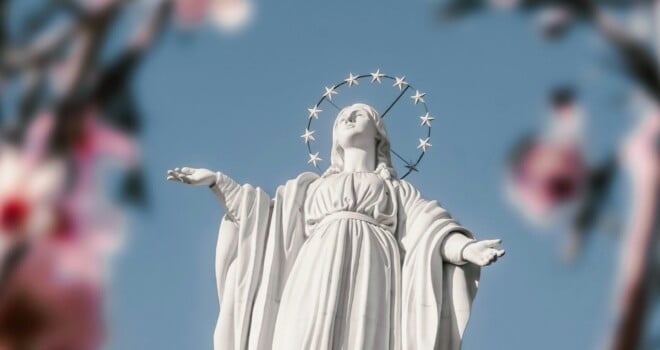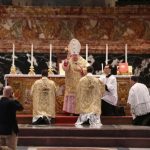The newly elected Pope Leo XIV, even prior to giving his first blessing, offered the following words to the faithful: “Our Mother Mary always wants to walk at our side, to remain close to us, to help us with her intercession and her love. So I would like to pray together with you. Let us pray together for this new mission, for the whole Church, for peace in the world, and let us ask Mary, our Mother, for this special grace.” Then he led everyone in praying the Hail Mary.
Leo’s devotion to Mary and the adoption of his name which connected him with Pope Leo XIII are deeply significant and contain important implications. His namesake and predecessor wrote 88 encyclicals, 12 of which were on the rosary. He rightly became known as the “Rosary Pope.” “Experience has shown,” he stated, “that to inculcate love for the Mother of God deeply in souls there is nothing more efficacious than the practice of the rosary.”
Mary is the mother of Jesus, but she is also the mother to everyone. At the foot of the Cross, Jesus said to John, “Behold thy mother.” These words bring forth the establishment of Mary as the motherly Mediatrix of all graces for the human family. Vatican II states that the Mother of Jesus is a mother to all of us in the order of grace (Lumen Gentium, no. 61).
Pope Leo XIV’s emphasis on “mother” is of particular significance in today’s world in which reproductive technology has blurred its very meaning. One woman can produce an egg that is fertilized in vitro. The resulting embryo can then be transferred to a second woman who carries the child to term. A third woman may raise the child. Who is the “mother?” Is it the genetic, gestational, or rearing woman? In many cases, the decision was left up to the courts. Mary, on the other hand, conceived Jesus, carried Him to term, and gave birth to Him. These three moments are celebrated in the Joyful Mysteries of the Rosary as the Annunciation, Visitation, and Nativity.
Mary defines what a mother is and gives it a universality. Where there is a mother, there must be a father. Mother, father, and progeny constitute a family. The motherhood of Mary is also an affirmation of the family. A devotion to Mary, therefore, leads very quickly to an affirmation of the family.
On May 16th, Pope Leo XIV told a group of diplomats representing 184 countries that governments can build harmonious and peaceful civil societies “above all by investing in the family, founded upon the stable union between a man and a woman.” Here, Leo is arguing against same-sex unions that cannot, of themselves, produce either a mother or a father. There can be no family without a mother.
Another aspect of Mary the Mother of God is her solicitude. As a loving mother, she embraces all her children, which is to say, everyone. Consequently, it is consistent with a devotion to Mary that the dignity of all her children will be honored. Therefore, Leo can also say to the diplomats that, “no one is exempted from striving to ensure respect for the dignity of every person, especially the most frail and vulnerable, from the unborn to the elderly, from the sick to the unemployed, citizens and immigrants alike.”
Pope Leo XIV’s devotion to Mary and his consequent honoring of marriage between a man and a woman is consistent with the “Theology of the Body,” as presented by Pope John Paul II. The now canonized saint begins his series of talks on September 5, 1979, by noting the Biblical understanding of marriage as between a man and a woman. He refers to Matthew 19:3ff, describing the time that Pharisees tested Christ about marriage and divorce. Christ’s answer is of dramatic significance:
“Have you not read that he who made them from the beginning made them male and female [and] for this reason a man shall leave his father and mother and be joined to his wife and the two shall become one flesh? So they are no longer two but one flesh. What therefore God has joined together, let no man put asunder.”
In this regard, Christ was uniting the New with the Old Testament. The Gospel, it may be said, offers an ironclad defense of marriage between a man and a woman as well as its indissolubility. It also validates the notion that there are but two sexes.
Pope Leo XIV’s devotion to Mary leads logically and incontestably to the affirmation of motherhood, fatherhood, the family, marriage between a man and a woman and its indissolubility, the duality of the sexes, and the dignity of all God’s children. These affirmations rule out same-sex marriage, divorce, the bifurcation of motherhood, transgender ideology, and abortion. Pope Leo XIV stands firmly in favor of the Gospel while opposing ideologies that are not only common in the secular world, but even within the Church.
Leo also points out that Mary is Our Lady of Good Counsel. She is a teacher and teaches her sons to be good fathers. Leo prays that Mary will continue to guide him so that he will be a good priest and that his own fatherhood will serve as a model for all the fathers of the world.
Leo XIV, like Christ, faces a challenge of immense proportions. We join him in our prayers as we attempt to imitate his saintly character.
Photo by Juan Domenech on Unsplash
















